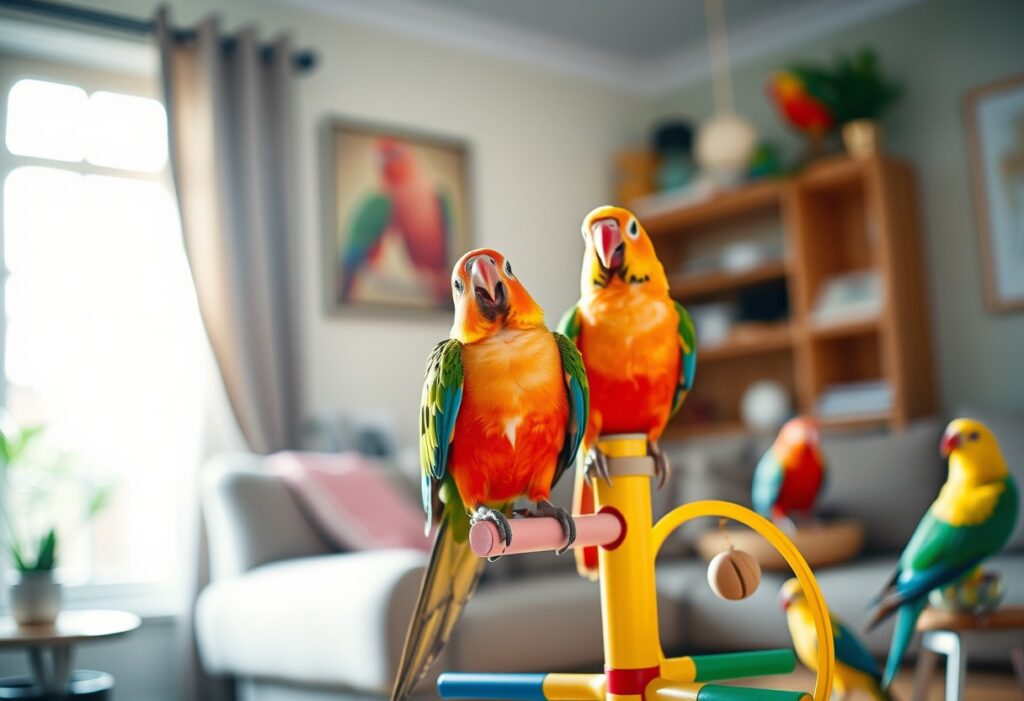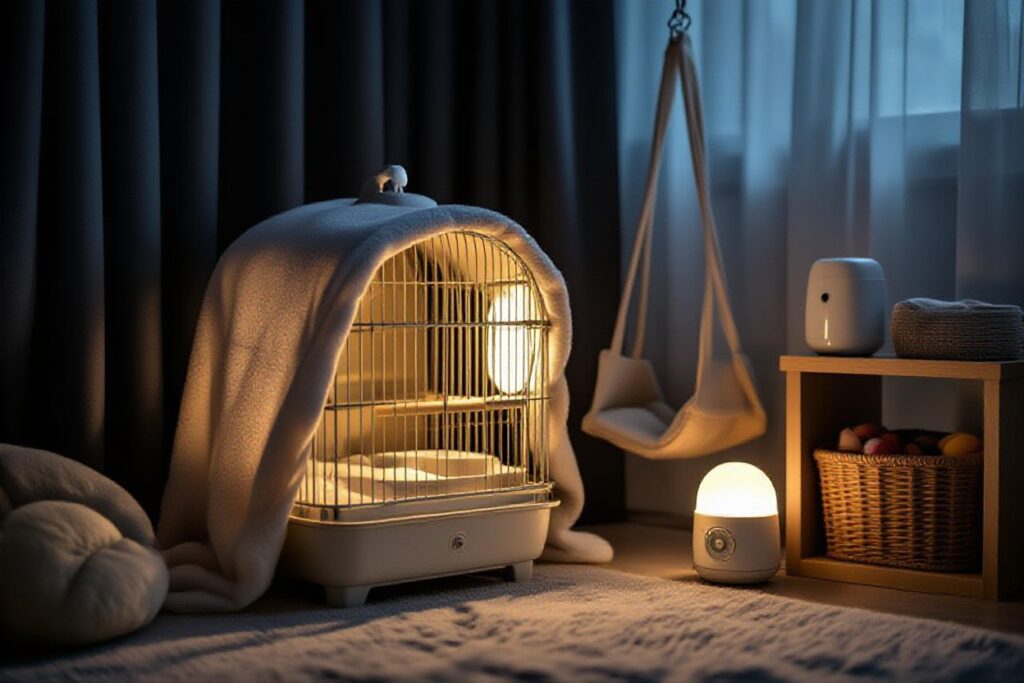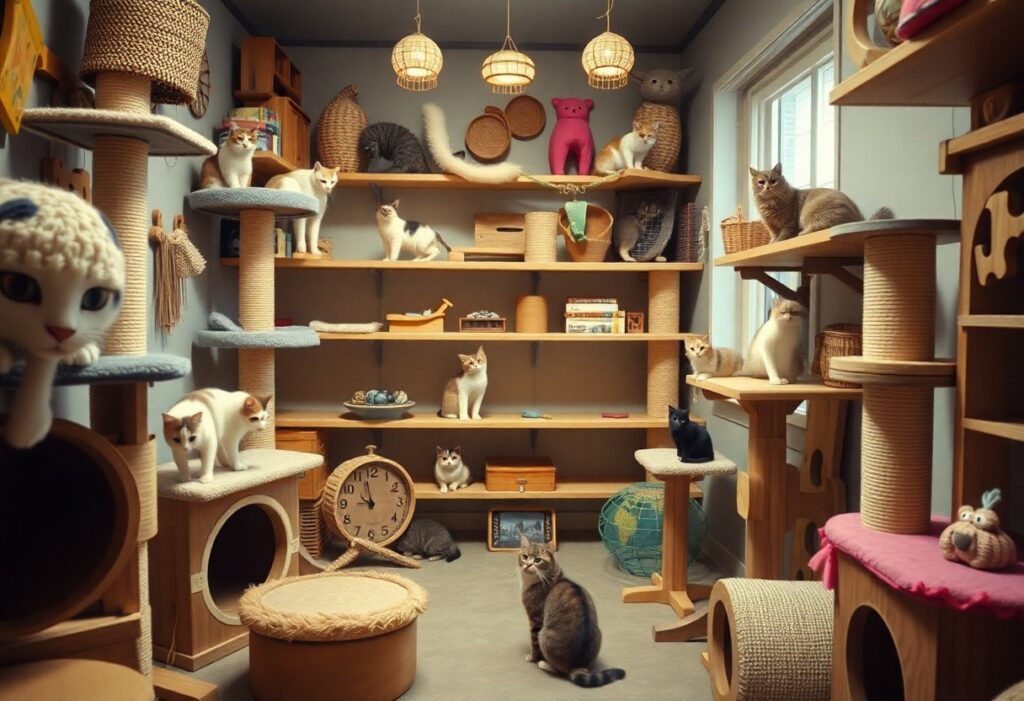There’s no denying that social interaction plays a crucial role in the well-being of your pet bird. Birds are inherently social creatures, and lack of interaction can lead to serious issues such as depression, aggression, or self-destructive behaviors. By engaging with your feathered friend through daily conversation, playtime, and even training, you enhance their happiness and strengthen your bond. Understanding their social needs is imperative for providing a fulfilling life, ensuring that your pet thrives both mentally and emotionally.
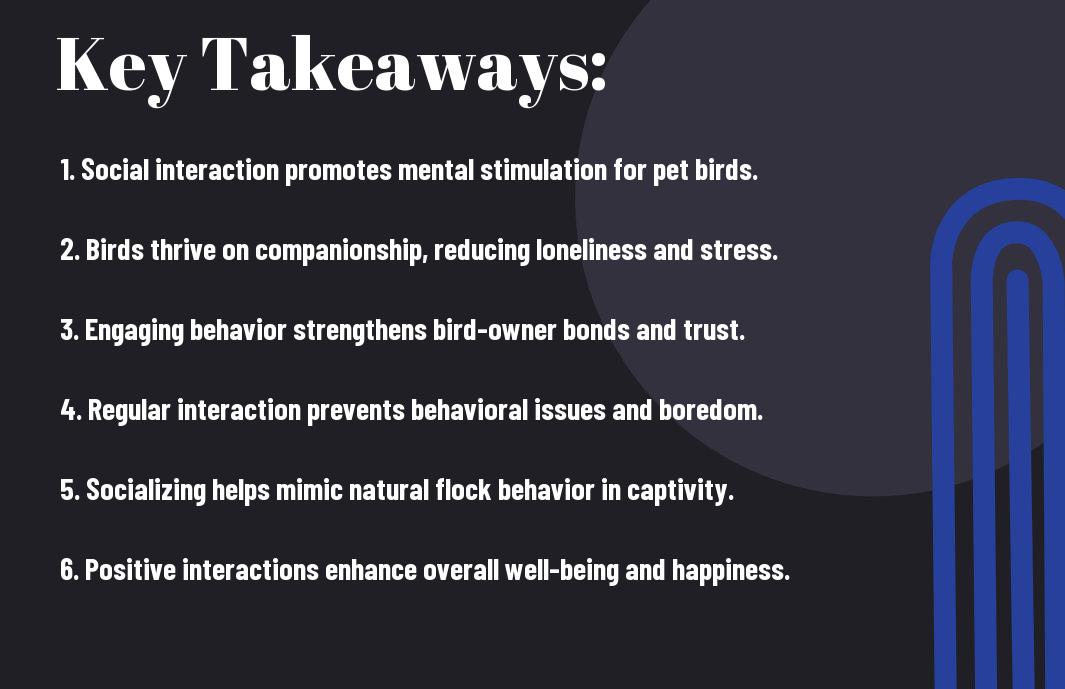
The Benefits of Social Interaction for Pet Birds
Before delving into the individual benefits, it’s important to recognize that social interaction is a cornerstone for the overall well-being of your pet bird. These creatures are inherently social animals, often found in flocks in the wild. When you engage with your bird, you not only foster a sense of companionship but also help mimic the natural social interactions they would experience in their wild habitats. This interaction is crucial in preventing many behavioral issues stemming from loneliness and boredom.
Emotional Well-being
With regular social interaction, your pet bird can experience a significant boost in its emotional well-being. Birds that engage socially often exhibit signs of happiness and contentment, such as singing and playfulness. This emotional engagement is vital; it allows your bird to feel secure and connected, reducing the instances of stress and anxiety that can arise from solitary living. A well-socialized bird is also less likely to develop harmful behaviors, such as excessive screaming or feather plucking.
Moreover, positive emotional health can result in a closer bond between you and your pet bird. When your bird trusts you and feels socially connected, it becomes more willing to explore, communicate, and engage in activities with you, leading to a richer and more fulfilling relationship.
Behavioral Development
Behavioral interactions with you and other pets can guide the behavioral development of your bird. Birds learn a lot from observing and mimicking, and social settings provide them with numerous opportunities to develop positive behaviors. For instance, when your bird interacts with you, it can learn vocalizations, tricks, and social cues, all of which are vital for a well-rounded personality. This understanding of interactions contributes to what can be called a well-adjusted bird.
It is also important to understand that socialization can mitigate negative behaviors. When birds lack social interaction, they may resort to destructive actions as a way to cope with their boredom or anxiety. Establishing a routine that involves regular social engagement, whether through playtime or simple companionship, diminishes the risk of these behavioral issues.
Social Skills Enhancement
For your pet bird, social interaction is a critical avenue for enhancing social skills. Birds that routinely engage with you, other pets, or even fellow birds learn to navigate their environments better. This adaptation is beneficial not only for their day-to-day interactions but also in building confidence. A confident bird is more likely to approach new situations without fear, whether it’s exploring new toys or meeting new people.
For instance, a bird that interacts with various people will learn how to communicate differently based on the social cues and body language it observes. This awareness helps them form healthy attachments and respond positively to various social situations.
Wellbeing thrives when you create an environment that allows your bird to express its natural behaviors. By engaging in social interactions, you are facilitating the development of important social skills, paving the way for a bird that is not only happy but also adaptable to various environments and situations.
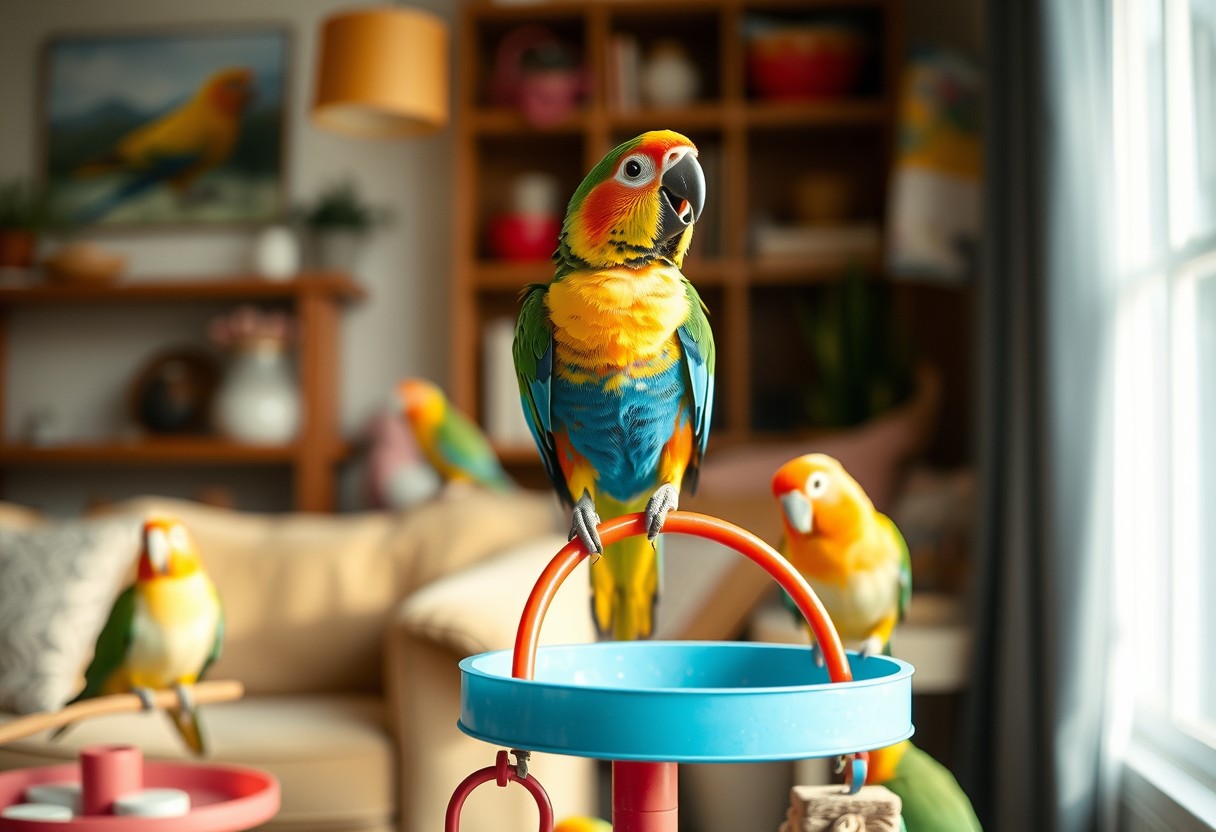
Types of Social Interactions
Little do many pet bird owners know that understanding the different types of social interactions their pets need is crucial for their overall well-being. Engaging your feathered friend socially is not just about providing companionship; it’s about ensuring they thrive mentally and emotionally. Below is a breakdown of the imperative types of social interactions:
| Type of Interaction | Description |
| Interactions with Humans | Human involvement can provide mental stimulation and bonding. |
| Interactions with Other Birds | Socializing with peers can enhance natural behaviors. |
| Interaction through Play | Playful interactions help to reduce stress and boredom. |
| Vocal Interactions | Talking and sounds help your bird communicate and explore. |
| Exploratory Interactions | Exploring environments enriches their learning experiences. |
Interactions with Humans
To create a strong bond with your pet bird, it is imperative to engage in interactions with humans. You can achieve this through daily handling, talking, and spending quality time with your bird. These interactions not only foster a deeper connection but also offer your bird the necessary social stimulation to keep it healthy and happy. Birds are incredibly social animals, and without this interaction, they can become lonely or develop behavioral issues.
Moreover, positive interactions with you can lead to your bird becoming more comfortable in its environment. Regular human interaction can introduce new sounds, words, and activities that can enrich your bird’s life. However, always ensure that your interactions remain positive and consistent to avoid overwhelming your bird, as some may find too much attention stressful.
Interactions with Other Birds
With the presence of fellow birds, your pet can benefit from natural social behaviors that they would typically exhibit in the wild. Such interactions with other birds can teach your pet important skills, like foraging and establishing social hierarchies. Birds are less likely to experience feelings of loneliness and might exhibit improved emotional health when they can communicate and socialize with other avian companions.
Understanding the dynamics of your bird’s interaction with others is crucial. You will often notice the differences in personality and how your bird expresses itself around its peers. Notably, if a bird is not properly socialized with other birds, it may develop issues such as aggression or fearfulness. Thus, finding ways for your bird to interact safely with other birds can significantly enhance its quality of life.
Interaction through Play
Any pet bird will thrive with ample opportunities to engage in play. Playtime acts as a fantastic medium for exercising your bird’s physical and mental capabilities. You can use toys, puzzles, or even interactive games to encourage play, enhancing your bird’s overall well-being. Furthermore, play serves as a way for you and your bird to bond, creating cherished moments and memories.
Interaction through play should always be tailored to your bird’s specific needs and preferences. By providing unworn toys, mirrors, and foraging challenges, you ensure your pet bird stays active and engaged. Importantly, keeping playtime supervised and safe will prevent any injuries or accidents, making it a positive experience for both you and your bird.
Interactions through play not only keep your bird entertained but also contribute significantly to its emotional health. After establishing a regular schedule for playtime, you will likely notice improvements in your bird’s behavior, reducing stress and increasing happiness.
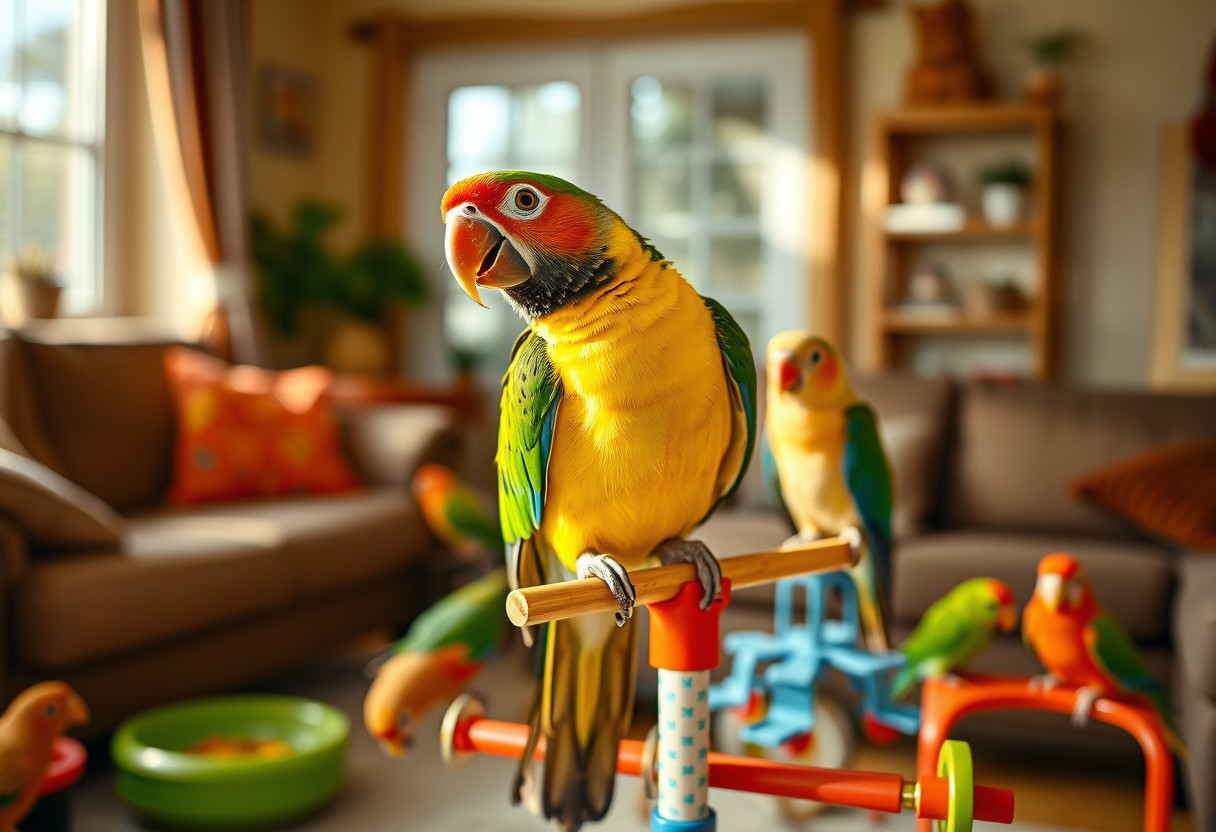
Signs of Social Needs in Pet Birds
Keep a close eye on your pet bird’s behavior, as their social needs can manifest in various ways. Understanding these signs will allow you to offer a more enriching environment that fulfills their need for social interaction. Recognizing when your feathered friend requires companionship is vital for their well-being and happiness. Here, we examine into specific signs you should be aware of, including vocalization patterns, changes in activity levels, and signs of stress or loneliness.
Vocalization Patterns
Patterns of vocalization can be one of the most telling indicators of your bird’s social needs. If you notice that your bird is increasingly vocal, it may be a sign that they are seeking interaction or attention. Birds, by nature, are social creatures and thrive on communication. Increased singing, whistling, or even squawking can be their way of trying to engage with you or express their loneliness. Paying attention to these vocal cues can help you understand when your bird is feeling isolated or distressed.
Conversely, a sudden drop in vocalization could also signify a problem. If your typically chatty bird becomes quiet and withdrawn, it may indicate that they are feeling lonely or disconnected from their social environment. This behavior should not be ignored, as it could lead to more significant emotional issues. Being responsive to these vocalization patterns is important for creating a supportive atmosphere for your pet bird.
Changes in Activity Levels
Activity levels in your pet bird can serve as a crucial indicator of their social needs. If you notice that your bird is less active than usual, it might mean they are experiencing isolation or boredom. Healthy birds typically engage in playful activities, so a dramatic reduction in their interaction with toys or surroundings suggests they may yearn for socialization. Increasing their social interactions can reignite their curiosity and enthusiasm for their environment.
Birds often thrive on stimulation from both their environment and their owners. If you see a reduction in their activity levels, consider spending more time with them, providing toys that encourage interaction, or even introducing a companion bird. Engaging your bird in play can not only alleviate boredom but can also fulfill their natural social needs and boost their emotional health.
Birds are incredibly social animals, so monitoring their activity levels is paramount. If you find they are often lethargic during the day or seem disinterested in their surroundings, it could lead to potential issues such as depression. Ensure you create a stimulating environment and dedicate time to interact with your bird every day, which can encourage healthier activity levels.
Signs of Stress or Loneliness
Birds express their emotional state in various ways, and being aware of the signs of stress or loneliness is important. If your pet bird is frequently plucking their feathers, pacing, or exhibiting aggressive behavior, these may be signs that they are not getting the social interaction they require. Increased vocalizations of distress or even screaming can also highlight their dissatisfaction with their current social situation. As a caring owner, it’s your responsibility to interpret these signs correctly and respond appropriately.
Additionally, if your bird hides or retreats to the far corners of their cage, it can indicate a feeling of vulnerability or stress. These behaviors can escalate if left unaddressed, leading to more profound emotional challenges for your pet. By staying attentive to your bird’s cues, you help ensure that their social needs are met and contribute positively to their overall mental state.
Signs of stress or loneliness can dramatically affect your bird’s health. Look for behaviors that deviate from their norm, and always prioritize interactions and provide them with opportunities to socialize. Address any changes in their behavior promptly to foster a happier, more balanced life for your cherished companion.
Conclusion
With this in mind, recognizing the importance of social interaction for your pet birds is crucial to their overall well-being. As highly social creatures, birds thrive in environments where they can engage, communicate, and connect, either with you or other birds. By providing ample opportunities for interaction—whether through playtime, verbal communication, or companionship—you help fulfill their natural instincts and create a more stimulating living environment for them. Prioritizing social interaction not only enhances their mental and emotional health but also strengthens the bond you share, leading to a happier and more fulfilling life for both you and your feathered friend.
Incorporating structured social interactions into your daily routine can significantly impact your pet bird’s quality of life. Engage them in conversation, allow them to explore their surroundings with your guidance, and introduce stimulating toys or puzzles that encourage cooperative play. By investing time and effort into enhancing their social experience, you contribute to their happiness and longevity. Ultimately, your commitment to understanding and fulfilling their social needs will create a harmonious relationship and ensure your pet bird lives a vibrant, enriched life alongside you.
FAQ
Q: Why is social interaction important for pet birds?
A: Social interaction is crucial for pet birds as they are inherently social creatures. In the wild, they live in flocks, which provides them not only companionship but also imperative social skills and behaviors. When kept as pets, birds rely on their human caretakers to fulfill this social need. Insufficient interaction can lead to loneliness, boredom, and behavioral issues such as feather plucking and excessive vocalization. Engaging regularly with your bird through talking, playing, and training helps to keep them mentally stimulated, emotionally balanced, and promotes a strong bond between the pet and owner.
Q: How can I provide adequate social interaction for my pet bird?
A: To provide adequate social interaction for your pet bird, dedicate time each day for direct engagement, such as talking, petting, and playing. You can also incorporate toys that encourage interaction, like puzzle toys that require manipulation. Additionally, consider introducing your bird to other pets or fellow birds, as long as it’s safe, which can provide a diverse social environment. Rotating toys and changing the scenery within their habitat can also stimulate their minds and mimic the social dynamics they would experience in the wild. Remember to observe their behavior and adjust the interaction methods based on your bird’s comfort level and preferences.
Q: What are the signs that my pet bird is not getting enough social interaction?
A: Signs that your pet bird may not be receiving enough social interaction include changes in behavior such as increased aggression, excessive vocalization, or lethargy. Other symptoms might be feather plucking, screaming, or retreating to the far corner of their cage. Birds that are bored or isolated may also develop destructive behaviors, such as chewing on cage bars or other objects. If you notice these signs, it’s imperative to evaluate the level of interaction you’re providing and adjust your routine to include more quality time with your bird. Regular interaction not only supports their emotional health but also enhances their general well-being.
